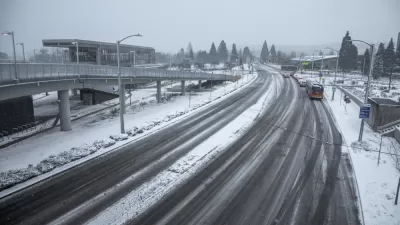Joining Chicago, Cincinnati, Denver, and Kansas City, Seattle now offers reduced bus fares to low-income residents. Some worry the program entrenches class differences and doesn't truly aid social mobility.

For Governing magazine, Daniel Luzer reports on a new program out of King County, Washington in which low-income residents will pay $1.50 rather than the usual $2.75 to ride the Metro bus. The intent is to lower barriers keeping the very poor away from jobs.
The public reaction has been mixed. "'The point of public transportation,' says Katie Wilson of the Transit Riders Union, a Seattle group working to improve transit in the city, 'is to provide affordable transportation -- for everyone.'" With rents on the rise, a two-tiered system might prop up the idea of 'two Seattles,' even on the bus.
Besides, residents who qualify may not even elect to sign up: "A decade after San Francisco introduced its program, fewer than 6 percent of riders participate, even though 20 percent of Bay Area residents live below the poverty line."
FULL STORY: In Some Cities, Your Bus Fare Now Depends on Your Income

Study: Maui’s Plan to Convert Vacation Rentals to Long-Term Housing Could Cause Nearly $1 Billion Economic Loss
The plan would reduce visitor accommodation by 25,% resulting in 1,900 jobs lost.

Alabama: Trump Terminates Settlements for Black Communities Harmed By Raw Sewage
Trump deemed the landmark civil rights agreement “illegal DEI and environmental justice policy.”

Why Should We Subsidize Public Transportation?
Many public transit agencies face financial stress due to rising costs, declining fare revenue, and declining subsidies. Transit advocates must provide a strong business case for increasing public transit funding.

Paris Bike Boom Leads to Steep Drop in Air Pollution
The French city’s air quality has improved dramatically in the past 20 years, coinciding with a growth in cycling.

Why Housing Costs More to Build in California Than in Texas
Hard costs like labor and materials combined with ‘soft’ costs such as permitting make building in the San Francisco Bay Area almost three times as costly as in Texas cities.

San Diego County Sees a Rise in Urban Coyotes
San Diego County experiences a rise in urban coyotes, as sightings become prevalent throughout its urban neighbourhoods and surrounding areas.
Urban Design for Planners 1: Software Tools
This six-course series explores essential urban design concepts using open source software and equips planners with the tools they need to participate fully in the urban design process.
Planning for Universal Design
Learn the tools for implementing Universal Design in planning regulations.
Smith Gee Studio
Alamo Area Metropolitan Planning Organization
City of Santa Clarita
Institute for Housing and Urban Development Studies (IHS)
City of Grandview
Harvard GSD Executive Education
Toledo-Lucas County Plan Commissions
Salt Lake City
NYU Wagner Graduate School of Public Service





























